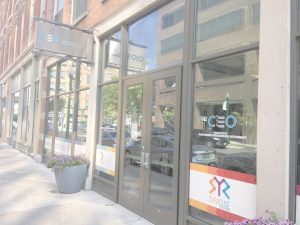LANSING, N.Y. — The National Institutes of Health (NIH) has awarded Rheonix, Inc. a grant as the company works to develop a system that it contends will simplify testing for the human immunodeficiency virus, or HIV.
The NIH awarded Rheonix — a town of Lansing–based developer of automated molecular-testing products — a Small Business Innovation Research (SBIR) Phase I fast-track grant of more than $189,000, the company announced. The firm expects a follow-up, 18-month, Phase II award of about $1.5 million.
Rheonix will use the funding to complete the development of a “fully automated self-confirming assay that can simultaneously detect HIV/AIDS antibodies and viral RNA in a single specimen,” as the firm described it in a news release.
(Sponsored)

Keeping Tabs on Employee Internet Use Could Create Employer Liability
Question: As a private sector employer trying to police our employees’ unauthorized use and/or abuse of our internet system, are we in danger of violating any privacy laws? Answer: If

Cybersecurity in Today’s Remote Work Environment
The response to the COVID-19 pandemic demonstrated that remote work was viable for many companies. Today, remote and hybrid work models have become standard options for most professionals. While remote
An assay is an investigative (analytic) procedure in laboratory medicine, pharmacology, environmental biology, and molecular biology. RNA is short for ribonucleic acid.
The Rheonix system will “simplify” HIV testing and eliminate the need for multiple patient visits to a health-care provider, the firm contends.
The NIH funding “further validates” the scientific merit of the company’s molecular-diagnostics testing platform, Tony Eisenhut, president of Rheonix, said in the release.
“The success of this program will add a valuable armament to reducing the health burdens of HIV in developing countries and other areas where testing resources are limited,” Eisenhut said.
The large number of people who don’t realize that they’re infected continues fueling the global HIV/AIDS “epidemic,” according to the Rheonix news release.
Governments around the world support various programs encouraging more frequent testing to reduce this number. However, most current testing procedures require that that a second, more sensitive and more specific test confirm any initial positive test, Rheonix said.
In “resource-limited” settings, the initial and confirmatory tests often rely upon simple “dipstick-like” tests that lack the sensitivity and specificity of “more sophisticated” testing, according to the Rheonix news release.
In addition, the second confirmatory test requires a second visit to a health professional that often does not happen.
Rheonix has worked with scientists at New York University (NYU) to develop a unique dual assay that can perform both the initial test and the confirmatory test simultaneously on the same specimen.
Under the terms of the grant, Rheonix will continue to collaborate with NYU as the complex bench-top assay is converted to the Rheonix, fully automated molecular-detection system.
NIH created the SBIR Phase I/II fast-track funding program to expedite funding decisions for Phase II efforts on applications that NIH believes have a “high potential” for commercial success.
A peer-review of a single application for both the Phase I and Phase II portions of proposed development efforts allows the elimination of the normal funding gap between Phase I and Phase II, and expedited progress toward commercialization, according to the news release.
Contact Reinhardt at ereinhardt@cnybj.com



